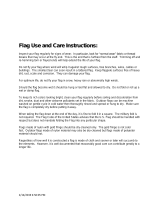
Congratulations – the Annin flag you have purchased is one of the very finest made. Given reasonable care it should provide maximum
service and satisfaction.
Here are a few simple suggestions to help you enjoy your new flag longer:
1. Only flags made specifically for exterior use should be displayed outdoors.
2. For the best results, do not expose your flag to rain, snow or abnormally high winds; these forces of nature can shorten its life
considerably. Should the flag become wet, it should be spread out and allowed to dry completely. Do not fold or roll-up a wet
or damp flag.
3. To keep its rich colors looking bright, clean your flag regularly
, before soiling and discoloration from dirt, smoke, dust and other
airborne contaminants “set” in the fabric. Outdoor flags can be hand-washed with warm water and a mild soap, then thoroughly
rinsed and spread out to dry. Do not let the flag stand in the wash water or you might experience some color “make off” onto the
white stripes. Professional dry cleaning is recommended for indoor/parade flags. Incidentally, many establishments will clean
Old Glory free of charge, especially during the period just prior to Flag Day, June 14.
4. Do not place the flag where the wind will whip it against rough surfaces, tree branches, wires, cables, etc. The smallest tear can
soon result in a tattered flag. Keep pole surfaces free of heavy dirt, rust, scale and corrosion that could damage your flag.
5. Inspect your flag regularly for signs of wear. In particular, look for “normal wear” fabric or thread breaks which may occur in
the “fly” end. This is the end farthest from the staff. Trimming off and re-hemming torn or frayed ends will help extend the life
of your flag.
How long will a flag last?
This is no exact answer. The U.S. Government generally expects a nylon or cotton bunting flag to last
approximately 90 days, based on daily usage from sunrise to sunset
– but not during periods of inclement weather. Tests have shown that in
some cases a flag flown 24 hours a day will last only one
-fourth as long as one flown during the daylight hours only.
Regardless of how well it is constructed, a flag is, after all, only a piece of cloth and will sooner or later succumb to the
elements.
However,
it has been well documented that reasonably good care can contribute
greatly to longer life.
Larger flags naturally represent a more significant investment and as such, should be given maximum protection.
Pay special attention to
paragraph #5 and keep your flag in good repair.
Consider having two flags and rotating them on a regular basis. Tests have shown that flag
fibers actually benefit from periodic “rest”. Also, you will not be without a flag while one is being cleaned or repaired.

